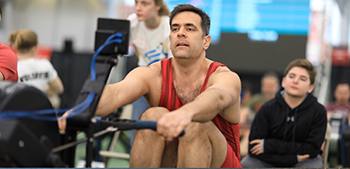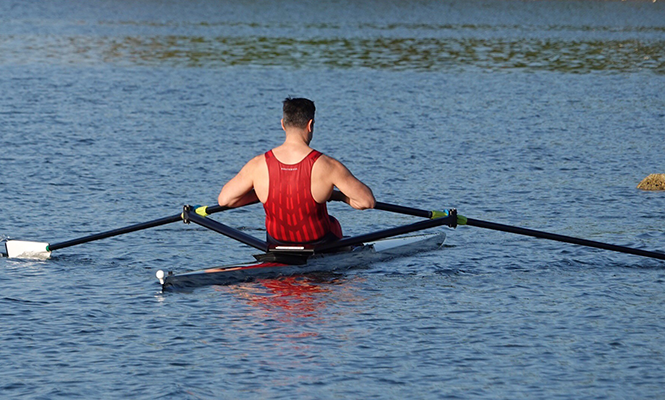It was a cold November morning in 2016 and I had just warmed up on the local high school track to do some intervals. The sun was just rising and the light and cool temperature felt good. At the 200-meter mark of my first 400-meter, I could feel a slight pull in my right Achilles, a feeling I sadly knew all too well from some chronic Achilles tendonitis I thought I had finally rehabbed. By 300 meters, I had to walk and at the 400-meter mark it became clear I had reinjured myself. With running out my future for many months, I set a new goal of rowing in Crash B’s, an indoor 2,000-meter ergometer race that I had not competed in since college, over twenty years ago.
Getting Fit for Rowing
I bought a Concept 2 ergometer and a physiatrist partner (a Cornell rower and one of the last guys cut from the 1988 Olympic team) gave me some workouts designed by an eccentric Russian physiologist who had coached both rowers and swimmers in the USSR. I knew that I needed to regain some lost strength. Through a series of conversations, I was hooked up with a lifting coach who introduced me to Olympic lifts. These have been a great challenge and fun over the last two plus years and have led to a 25% increase in my strength at 47! With these workouts, my Achilles slowly improved. Unlike running, my body seemed to be able to take the rowing and lifting workouts without breaking down.
 Success and Next Challenges
Success and Next Challenges
I placed 13th at Crash Bs that year in my age group and have improved in placement to 8th in 2018, then 5th in 2019. Each year, my time has been in the top 100 in the world for my age. With the regained rowing fitness, the colleague who had given me the workouts convinced me that next I needed to learn to row a single scull. In college, I was a mediocre Division I rower placed in the middle of the boat. I had spent very little time in the technically more challenging smaller boats with one, two and four rowers and had spent most of my hours rowing eights. I borrowed a friend’s very heavy, very stable French-made training shell as a starter boat and bought a set of oars. I spent a summer rowing this stable platform in 2017 and felt that I had at least a sense of how to move a single scull.
Last spring a freak accident with my powerboat tore one head of my right bicep that needed to be repaired. The colleague who initially looked at my arm felt that the bicep was not ruptured, so I actually went to Craftsbury, Vt., to a rowing camp for a week before learning that, in fact, it was ruptured and I would be out of commission for the rowing season. The beautiful Fluidesign racing shell that I bought lay dormant for a year. There is no doubt in my mind that having the Crash B race in 2019 as a goal helped me recover my bicep strength and flexibility at a rate that would not have been possible without that objective. As I rigged my boat this spring when the water temperature where I row was still in the 50s, I realized the challenge ahead. As my children saw the boat in the yard, they wondered how their 230-pound father would fit the slender boat. My first row out, I unceremoniously flipped the boat; however, with each following row, balance and confidence has come to me. Initially, just using the arms and back led to a few brave full slide strokes and now tens of strokes. Not ready to race yet, but the possibility that seemed so far away is now closer.
Rowing, Neurosurgery and Life
Paralleling an article I cowrote on skill acquisition in neurosurgery, the learning of new skills is an important part of my life, even outside of neurosurgery. Just like in college with challenges of pre-medical work and rowing, the balancing of work, family and self remains a juggle. Rowing has brought me back to a community of old friends and has created new friendships. The beauty of the early mornings on the water, the serenity of the boat running well and the fitness that comes with it all add value to my life. Furthermore, I have enjoyed the challenges of learning to scull, to Olympic lift and training in the dead of winter and I know these activities will prolong my life in and out of neurosurgery.
[aans_authors]








